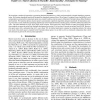Free Online Productivity Tools
i2Speak
i2Symbol
i2OCR
iTex2Img
iWeb2Print
iWeb2Shot
i2Type
iPdf2Split
iPdf2Merge
i2Bopomofo
i2Arabic
i2Style
i2Image
i2PDF
iLatex2Rtf
Sci2ools
LREC
2010
2010
Parsing to Stanford Dependencies: Trade-offs between Speed and Accuracy
We investigate a number of approaches to generating Stanford Dependencies, a widely used semantically-oriented dependency representation. We examine algorithms specifically designed for dependency parsing (Nivre, Nivre Eager, Covington, Eisner, and RelEx) as well as dependencies extracted from constituent parse trees created by phrase structure parsers (Charniak, Charniak-Johnson, Bikel, Berkeley and Stanford). We found that phrase structure parsers systematically outperform algorithms designed specifically for dependency parsing. The most accurate method for generating dependencies is the Charniak-Johnson reranking parser, with 89% (labeled) attachment F1 score. The fastest methods are Nivre, Nivre Eager, and Covington. When used with a linear classifier to make local parsing decisions, these methods can parse the entire Penn Treebank development set (section 22) in less than 10 seconds on an Intel Xeon E5520. However, this speed comes with a substantial drop in F1 score (about 76% f...
| Added | 29 Oct 2010 |
| Updated | 29 Oct 2010 |
| Type | Conference |
| Year | 2010 |
| Where | LREC |
| Authors | Daniel Cer, Marie-Catherine de Marneffe, Daniel Jurafsky, Christopher D. Manning |
Comments (0)

